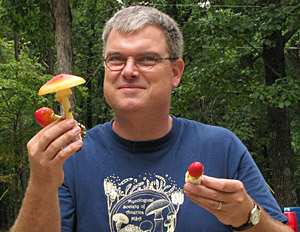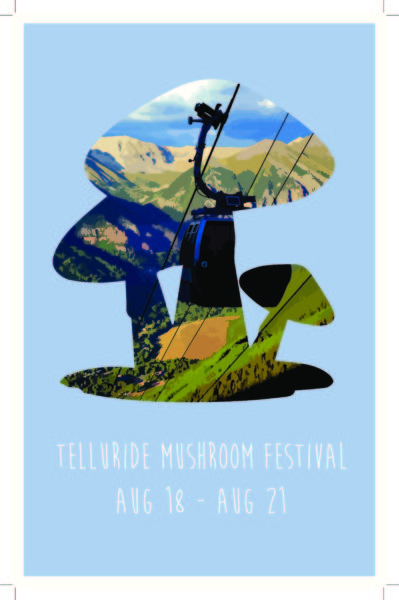
10 Aug 36th Annual Telluride Mushroom Festival: Executive Director Britt Bunyard & More
The 36th annual Telluride Mushroom Festival –Thursday, August 18 – Sunday, August 21, 2016 – with Early Bird foray and beer launch party Wednesday, August 17. Festival celebrates the many uses of all things fungi. Again this year, lectures and films event are scheduled at the historic Sheridan Opera House, and other venues around town, so seats are limited. If you plan to attend talks, go on a foray, and enjoy the culinary cook-off, it is best to purchase a full festival pass; single lecture tickets are based on space available. And passes are selling fast. Go here to purchase tickets or go here. Full weekend schedule here.
And meet 2016 Festival Director Britt Bunyard. Scroll down to the bottom of the story to listen to Britt’s podcast, including Festival highlights.

Right now millions of dollars are being spent by the likes of hedge fund billionaires and companies such as Google to hack the code of life and push the human life span past what in the scientific community is considered the apparent max (of 120 years). But based on hieroglyphics dating back almost 5000 years, Egyptians already held the secret to immortality: mushrooms.
“The delicious flavor of mushrooms intrigued the pharaohs of Egypt so much that they decreed mushrooms were food for royalty and that no commoner could ever touch them. This assured themselves the entire supply of mushrooms. In various other civilizations throughout the world, including Russia, China, Greece, Mexico and Latin America, mushroom rituals were practiced. Many believed that mushrooms had properties that could produce super-human strength, help in finding lost objects and lead the soul to the realm of the gods….,” says mushroominfo.com.
After the conquest of Mexico in the 16th century, Catholic priests observed the consumption of hallucinogenic mushrooms by natives, who later shared their visions of The Future. Was it magic? Short answer: no, psilocybin, a naturally occurring psychedelic compound found in about 200 species of mushrooms.
In the 17th century, the Sun King, King Louis XIV, was allegedly the first to grow mushrooms in his kingdom in special caves near Paris. Soon, the French had introduced mushrooms into haute cuisine.
By the late 19th century, across the pond, Americans were cooking up mushrooms in our own kitchens.
And today? Given a growing trend among foodies to favor farm-to-table or locally sourced taste treats, mushrooms are more popular than ever, with entire cookbooks devoted to their preparation. And that is a good thing because mushrooms contain some of the most potent natural medicines on the planet.
Health benefits of the approximately 100 species of mushrooms being studied for such properties include: immune system boost (by increasing the production of antiviral and other proteins released by cells while they are trying to protect and repair tissue); source of vitamin D and antioxidants; pump metabolism because mushrooms contain vitamin B, essential for converting food into fuel.
According to mycologist Paul Stamets, as a defense against bacterial invasion, fungi have developed strong antibiotics, which also happen to be effective in humans too.
Penicillin, streptomycin, and tetracycline all come from fungal extracts.
The potent anti-inflammatory characteristics of Cordyceps could prove helpful for mitigating the impact of asthma, stroke, arthritis. They also are shown to have antidepressant effects, aid in normalizing cholesterol levels, and more.
Some mushrooms, particularly Turkey Tail and Reishi, appear to contain an arsenal of cancer-busting compounds.
At the 36th annual Telluride Mushroom Festival, the largest wild mushroom festival in Northern America, microbiologist, professional mycologist, and organic gardener Tradd Cotter is scheduled to talk about his research into fungi as a means of fighting superbugs known to be resistant to conventional treatments.
Mushrooms as the future of medicine?
Perhaps the Egyptians were on to something.

Whatever your party affiliation– mycophilic or mycophobic – the rich history of mushrooms is ripe with royalty, ritual (shamanic to hedonistic), remedy, and remediation, all forms of which will be on display over Mushroom Festival weekend. The 2016 theme is the “The Origins of Mushrooms,” introduced by Festival Director, Britt Bunyard, publisher and editor-in-chief of FUNGI Magazine.
Britt has also worked as a full-time biology professor in Ohio and Wisconsin, teaching a broad range of undergraduate and graduate courses in evolution, microbiology, mycology, invertebrate zoology, biochemistry, and environmental science.
In addition to Britt, featured presenters include Laura Guzman-Davalos on Psilocybe species of the world; Michele Ross, president, Impact Network, on neurogenesis, the growth and development of nerve tissue; Robert Dale Rogers, author, “The Fungal Pharmacy”, on medicinal mushrooms and other notables in the field, and Denis Benjamin, retired physician and world authority on toxic mushroom species.
Beloved “Shroompa” Art Goodtimes, and mycologist/author/teacher (at New York Botanical Gardens) Gary Lincoff are keynotes, officially opening the weekend Thursday morning. They are event co-founders.
To learn more about Britt Bunyard and the upcoming Mushroom Festival, listen to his podcast.
More about Britt Bunyard:

Additional scholarly achievements include publication of scientific papers in 16 different international research journals, one patent, and articles in popular science magazines.
Britt has served as Editor-in- Chief of NAMA’s journal McIlvainea and newsletter The Mycophile, and as a subject editor for the Entomological Society of America’s journal “Annals of the Entomological Society of America.” Britt gives several invited lectures in North America and abroad each year and regularly takes part in many mycological events and forays. He has been featured on NPR’s “All Things Considered,” has reviewed several published mushroom guide books. Britt has been a consultant for National Geographic Magazine and, most recently, for an episode of PBS’s NOVA television program.
He is married and has three children, and has recently relocated to southern California from the Midwest.


Sorry, the comment form is closed at this time.